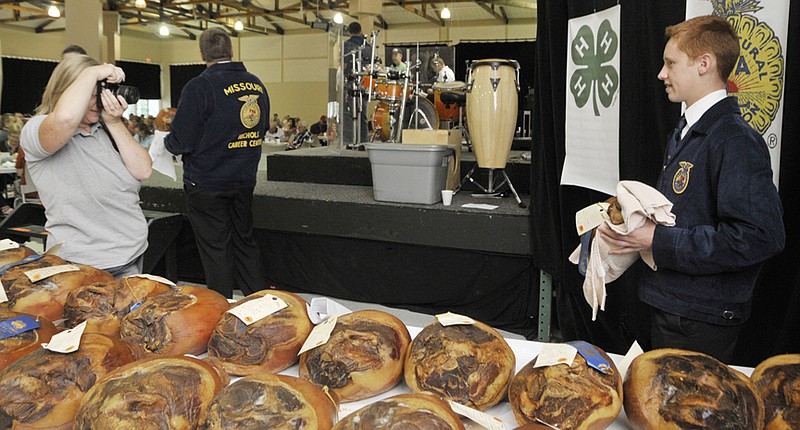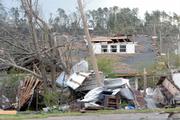Zach Wolken will be a senior when classes resume this month at Russellville High School.
And he'll head back to school with a little extra money in his pocket, thanks to FFA projects at this week's Jefferson City Jaycees Fair.
"I got to sell a steer and a ham," he explained Friday, after Cole County's annual 4-H/FFA Ham Breakfast and Auction.
"The ham you don't have to do really nothing with, besides curing it.
"But the steer, it takes a lot more work."
Business owners and managers, some politicians - and a few relatives - bid at the auctions, and the students who've raised an animal or cured a ham get to keep the proceeds.
"It's just a good way to save up money for something," Wolken said. "Save it and spend a little bit.
"Pay the feed bill."
Shianne Walther, who starts her sophomore year at Helias Catholic High School this fall, plans to save the $250 she earned from her ham.
"It goes toward college," she explained. "I kind of want to get into horses - but I'm not sure what, yet."
Like Wolken, Walther said curing a ham is "really easy ... but you have to work with it."
While raising livestock is more of a daily task, making sure there's enough food and water and the animal gets appropriate exercise and grooming, curing a ham involves occasional work separated by stretches of letting nature work without human intervention.
"And then, after so long, you get to sell it and make a good profit on it," Walther noted.
Jean Hong, who will be a Jefferson City High School junior this fall, said: "I think it's more fun just to cure the ham - cure it yourself and then hang it.
"I think it's a great project."
After high school, Hong said, she wants to pursue studies "to be an equine specialist."
Wyatt Nelson, who graduated from Jefferson City High School in May, plans to major in auto collision maintenance at Linn State Technical College, starting this fall.
But he's been curing hams for several years.
"I've always had an interest in hams and stuff," he explained. "I've always been fascinated with this profession."
Though his career plans don't focus on agriculture, he said, the competition has been valuable.
"It helps build character, and shows how entrepreneurship and all of that works," Nelson explained. "It teaches you leadership and responsibility," including meeting ahead of time with potential buyers at the auction, and promoting the ham as an auction purchase.
This year's ham auction raised at least $16,500 - some bidders offered premiums on specific hams, and that extra money wasn't included in the sale prices used for this story.
Students sold 69 hams during Friday morning's auction - and two of those hams were returned for a second round of bids, raising $575 for the FFA Foundation and $225 for the 4-H Council.
The sale prices ranged from $125 (seven hams) to $400 (five hams).
The largest group, 10 hams, sold for $250 each.
Buyers included seven area banks, 17 hams for a total of $3,725 - and 11 area politicians, 12 hams for a total of $2,750.
The rest of the hams went to 16 businesses and 10 individuals - including one grandfather who paid $400 for two hams cured by his two grandchildren.
The Jefferson City Jaycees bought one ham.
Some have suggested in recent weeks that the Jaycees, who operate the annual fair in Cole County during the last week of July, wants to separate the youth agriculture programs from the fair.
Jenny Flatt, the Extension Center's 4-H Specialist, said Friday: "That's absolutely untrue.
"We receive $10,000 every single year from them, to support premium moneys that go toward our 4-H and FFA exhibits in the building, and livestock."
And Jaycees President Joe Heard said recently the subject "has never been brought up to me, at all. Before the fair is over, every year we write (them) a check for between $10,000 and $12,000."
Flatt said the students also do work at the fairgrounds to help get the livestock buildings ready before each fair, and cleaned up afterward.
"We're so proud to have good partnerships with people like the Jaycees and the Cole County Commission," Flatt said, "to make our youth development goals happen."



